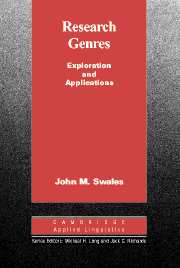Book contents
- Frontmatter
- Contents
- Series editors' preface
- Acknowledgments
- Chapter 1 Toward a world of genre
- Chapter 2 The role of English in the research world
- Chapter 3 Theoretical and methodological issues
- Chapter 4 “Getting done”: The Ph.D. dissertation
- Chapter 5 The Ph.D. defense
- Chapter 6 Research talk and research talks
- Chapter 7 The research article revisited
- Chapter 8 Three remaining issues
- Appendix
- Notes
- References
- Author index
- Subject index
Chapter 2 - The role of English in the research world
Published online by Cambridge University Press: 05 October 2012
- Frontmatter
- Contents
- Series editors' preface
- Acknowledgments
- Chapter 1 Toward a world of genre
- Chapter 2 The role of English in the research world
- Chapter 3 Theoretical and methodological issues
- Chapter 4 “Getting done”: The Ph.D. dissertation
- Chapter 5 The Ph.D. defense
- Chapter 6 Research talk and research talks
- Chapter 7 The research article revisited
- Chapter 8 Three remaining issues
- Appendix
- Notes
- References
- Author index
- Subject index
Summary
This chapter focuses on the linguistic variable in research activities, along with attendant considerations such as the provenance of research publications and the status of native and non-native speakers of English, today's premier research language. As it has turned out, these have become increasingly complex issues. Part of the reason for this derives from the trends outlined in Chapter 1, but another part comes from the difficulty in reading the available research on these topics. Whereas the number of publications devoted to the linguistic variable (and its consequences) has rapidly expanded over the last decade, the studies reflect the epistemologies and methodologies of many different disciplines and so are hard to consolidate in a fully coherent manner. Finally, the issue of the role of English in research is politically and ideologically contested (for fully understandable reasons), and this further complicates the picture. This chapter then represents my “best shot” at mapping difficult terrain.
The Language of Journals
In Chapter 6 of Genre Analysis, I produced some quantitative data to argue against an overwhelming Anglophone supremacy in research articles, and concluded:
While there is no doubt that English has become the world's predominant language of research and scholarship, the extent of that predominance may have been exaggerated. High overall percentages can indeed be extracted from the major US-located international data bases, but these data bases are themselves pre-disposed to English language sources.
(1990: 99)- Type
- Chapter
- Information
- Research GenresExplorations and Applications, pp. 33 - 59Publisher: Cambridge University PressPrint publication year: 2004

